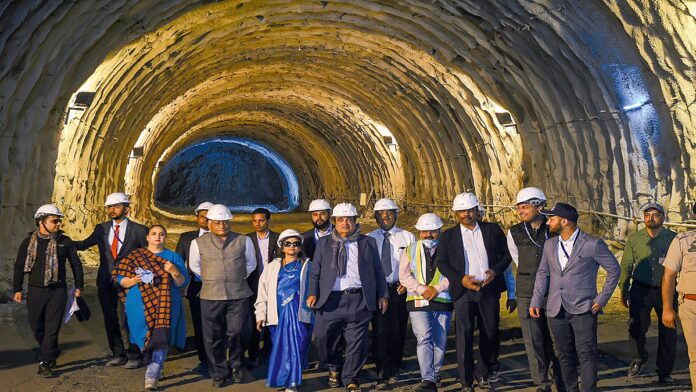Sonamarg (Jammu and Kashmir) [India], January 13: Prime Minister Narendra Modi inaugurated the Z-Morh Tunnel in Sonamarg, Jammu & Kashmir, on Saturday, in the presence of Union Minister Nitin Gadkari, J&K LG Manoj Sinha, and former CM Omar Abdullah.
At the inauguration, Union Minister Nitin Gadkari emphasized the critical role infrastructure plays in national development. He stated, “To make India a developed nation, we must enhance infrastructure. Without improving water, energy, transport, and communication, we cannot promote industries, tourism, or trade. The Prime Minister has given us the responsibility to develop Jammu and Kashmir, making it prosperous and developed along with India.”
Gadkari also highlighted the mission to attract industries and businesses to the region, contributing to the overall prosperity of Jammu and Kashmir.
The Z-Morh Tunnel, constructed at a cost of Rs 2,717 crore, is set to transform connectivity and stimulate economic activity in the area.
On social media, Gadkari referred to the tunnel as a “Marvel of Engineering” and praised its role in ensuring year-round connectivity between Srinagar and Ladakh. He further stated, “The Z-Morh Tunnel, constructed at a total cost of Rs 2,717 crore and spanning 11.98 km, ensures uninterrupted traffic flow between Srinagar and Ladakh year-round, bypassing avalanche-prone areas. It will reduce travel time, boost the movement of local goods, promote winter tourism, and support religious tourism, significantly enhancing the regional economy.”
The Z-Morh Tunnel also features a bi-directional, 6.4-kilometre main tunnel and a parallel escape tunnel for safety. It includes a 3.7 km creeper lane for heavy vehicles, a 4.6 km western approach road, a 0.9 km eastern approach road, and several bridges.
In addition to its economic and tourism benefits, the tunnel will play a strategic role in military logistics and reduce the risks posed by avalanches. By connecting the Srinagar Valley to Ladakh more efficiently, it enhances defense preparedness while fostering regional integration.
The tunnel, alongside the Zojila Tunnel set to be completed by 2028, will cut the route length from 49 km to 43 km and increase vehicle speeds from 30 km/hr to 70 km/hr, ensuring seamless connectivity for both civilians and defense personnel in Jammu and Kashmir and Ladakh.


